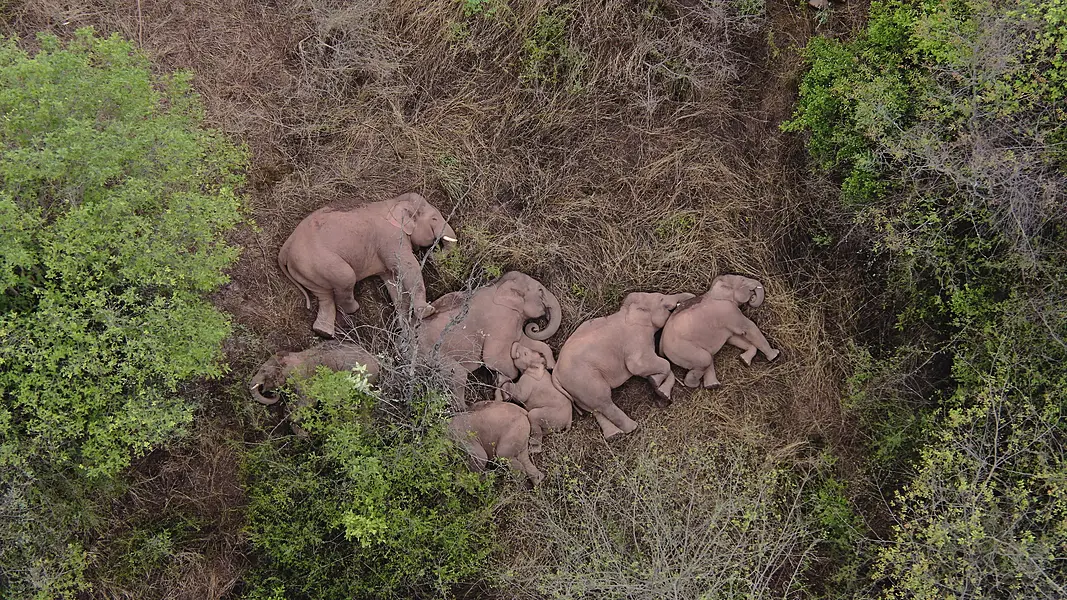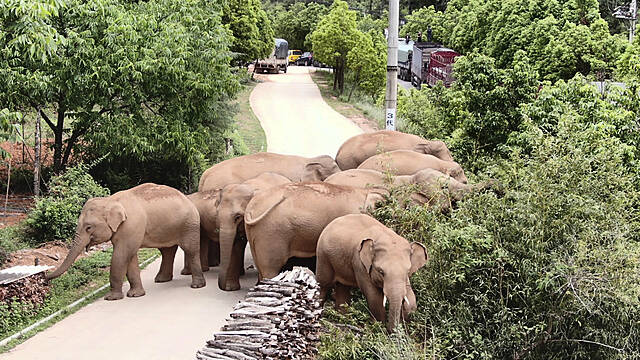A herd of wandering elephants in China have become international stars.
Major global media are chronicling the herd’s more than year-long, 500-kilometre (300-mile) trek from their home in a wildlife reserve in mountainous south-west Yunnan province to the outskirts of the provincial capital Kunming.
Twitter and YouTube are full of clips of their various antics, particularly those of two calves, who slipped into an irrigation ditch and had to be helped out by older members of the group.

The elephants have been trending for days on China’s Weibo microblogging service, with photos of the group sleeping attracting 25,000 posts and 200 million views on Monday night.
The 15-strong herd has been caught at night trotting down urban streets by security cameras, filmed constantly from the air by more than a dozen drones and followed by those seeking to minimise damage and keep both pachyderms and people out of harm’s way.
They have raided farms for food and water, visited a car dealership and even showed up at a retirement home, where they poked their trunks into some of the rooms, prompting one elderly man to hide under his bed.
While no animals or people have been hurt, reports put damage to crops at more than one million dollars (£705,000).

Sixteen animals were originally in the group, but the government says two returned home and a baby was born during the walk.
The herd is now composed of six female and three male adults, three juveniles and three calves, according to official reports.
What exactly motivated them to make the epic journey remains a mystery, although they appear to be especially attracted to corn, tropical fruit and other crops that are tasty, plentiful and easy to obtain in the lush tropical region that is home to about 300 of the animals.
Others have speculated their leader may simply be lost.

Elephants are given the top level of protection in China, allowing their numbers to steadily increase even as their natural habitat shrinks, and requiring farmers and others to exercise maximum restraint when encountering them.
Government orders have told people to stay inside and not to gawk at them or use firecrackers or otherwise attempt to scare them away.
So far, more passive means are being used to keep them out of urban areas, including the parking of trucks and construction equipment to block roads and the use of food drops to lure them away.
As of Tuesday, the herd remained on the outskirts of Kunming, a city of seven million, with one of the males having moved away on his own, creating even more excitement – and worry – for those attempting to keep tabs on them.

A news release on Monday from a provincial command centre set up to monitor the group said the elephants appeared to be resting, while more than 410 emergency response personnel and police personnel, scores of vehicles and 14 drones were deployed to monitor them.
Area residents were evacuated, temporary traffic control measures implemented, and two tons of elephant food put in place.
Another objective was to “maintain silence to create conditions for guiding the elephant group to migrate west and south”, the command centre said.







